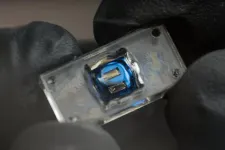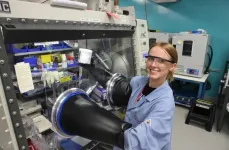(Press-News.org) Researchers at University of California San Diego School of Medicine found an FDA-approved drug used to treat breast cancer has the potential to be an effective therapeutic for a specific type of appendix cancer.
The clinical trial results, publishing in the October 16, 2024 online edition of the Journal of Clinical Oncology, showed the oral medication, known as palbociclib, stabilized tumor growth and reduced blood tumor marker levels in patients with peritoneal mucinous carcinomatosis (PMC). This form of cancer originates in the appendix and is often resistant to standard chemotherapy.
“Finding that a breast cancer drug is successful in treating a subset of appendix cancer — where treatment options are currently limited — marks a significant advancement in our fight against this disease,” said co-senior author Andrew Lowy, MD, professor in the Department of Surgery and chief of the Division of Surgical Oncology at UC San Diego School of Medicine and clinical director for cancer surgery at Moores Cancer Center at UC San Diego Health. “This breakthrough introduces the first targeted therapy for this rare cancer.”
Appendix cancer is extremely uncommon, accounting for less than 1% of all gastrointestinal cancers, with the American Cancer Society estimating fewer than 2,000 cases diagnosed in the U.S. each year.
The study cohort involved 16 participants diagnosed with PMC, most of whom had previously received other treatments without success. Researchers analyzed the genetic mutations present within these cancers and found that tumors with mutations in one specific gene, GNAS, responded well to the drug. In these patients, blood markers associated with cancer activity were reduced in more than 80% of patients.
Laboratory results also showed that the drug slowed or stopped the multiplication of cancer cells, offering a well-tolerated alternative to chemotherapy, which is often associated with severe side effects.
“This medication can be implemented immediately without the need to wait for a new drug to be developed or for FDA approval,” said co-senior author Shumei Kato, MD, associate professor of medicine at UC San Diego School of Medicine and medical oncologist at UC San Diego Health.
Kato, who is also a UC San Diego Moores Cancer Center member, adds that the study underscores the advanced use of existing cancer treatments.
“The findings signal a promising new era for the treatment of appendix cancer and potentially other rare cancers with similar genetic mutations.”
Next steps include investigating how combining this drug with both traditional chemotherapies and newer targeted therapies could further enhance its effectiveness.
“This groundbreaking study validates our unique position as the only National Cancer Institute (NCI)-designated Comprehensive Center in the region and our commitment to discovering and offering the most leading-edge treatment options,” said Diane Simeone, MD, director of Moores Cancer Center at UC San Diego Health. “As an academic medical center, our clinical researchers are leading trials that are identifying promising new treatments and providing hope for patients who previously had few options.”
Co-authors of the study include: Jonathan Weitz, Daisuke Nishizaki, Joy Liau, Jay Patel, Isabella Ng, Siming Sun, Dana Ramms, Jingjing Zou, Brian Wishart, Jordan Rull, Joel Baumgartner, Kaitlyn Kelly, Rebekah White, Jula Veerapong, Mojgan Hosseini, Hitendra Patel, Gregory Botta, Silvio Gutkind, and Herve Tiriac, all at UC San Diego.
Funding support for the study came, in part, by grants from the Levine Family Chancellor’s Endowed Chair in Surgical Oncology, National Organization for Rare Disorders, Appendix Cancer Pseudomyxoma Peritonei Research Foundation (R21CA273974, 1F32CA265052-01) and generous gifts from the estate of Elisabeth and Ad Creemers, the Euske Family Foundation, the Gastrointestinal Cancer Research Fund and the Peritoneal Metastasis Research Fund. Confocal imaging and histology core done with support from the UC San Diego Health Specialized Cancer Support Center (P30 2P30CA023100).
# # #
END
Study: breast cancer drug shows potential for rare appendix cancer
Innovative application of an existing drug offers promising alternative treatment to traditional chemotherapy for patients with appendix cancer
2024-10-16
ELSE PRESS RELEASES FROM THIS DATE:
Specific type of DNA could be a target of future cancer therapies
2024-10-16
Research published in Nature Genetics on Oct.14, by Yale Cancer Center researchers at Yale School of Medicine, found a higher concentration of a specific kind of DNA — extrachromosomal or ecDNA — in more aggressive and advanced cancers that could mark them as targets for future therapies.
Using data available from The Cancer Genome Atlas, the International Cancer Genomics Consortium, the Hartwig Medical Foundation, and the Glioma Longitudinal Analysis Consortium, the researchers considered more than 8,000 tumor samples, divided between newly diagnosed untreated tumors and those that had been through previous treatments ...
New Director of the Bates Center for the Study of the History of Nursing
2024-10-16
PHILADELPHIA (October 16, 2024) – J. Margo Brooks Carthon, PhD, RN, FAAN, the Tyson Family Endowed Term Chair for Gerontological Research; Professor of Nursing in the Department of Family and Community Health; and Associate Director of the Center for Health Outcomes and Policy Research, has been appointed the new Director of the Barbara Bates Center for the Study of the History of Nursing (Bates Center), the preeminent history of nursing research center and archive. The Bates Center amplifies the importance of the history of nursing and healthcare to the development of crafting effective health policies and strategies to improve health for all.
“The ...
Scientists developing microchips with brain and lung tissue to study viral neuroinflammation
2024-10-16
Scientists are developing advanced tools to understand and treat neurological symptoms such as brain fog associated with respiratory diseases like influenza. The Biomedical Advanced Research and Development Authority (BARDA), part of the Administration for Strategic Preparedness and Response (ASPR) within the US Department of Health and Human Services (HHS), awarded a three-year contract to researchers at the University of Rochester to develop a technology to model respiratory disease effects on the brain ...
Discover science: Applications open for summer 2025 undergraduate internships
2024-10-16
WASHINGTON, DC – As the nation continues to build a diverse, clean-energy workforce, the Department of Energy (DOE) today announced that applications are being accepted for the Summer 2025 term of two undergraduate internship programs.
The Office of Science Undergraduate Laboratory Internships (SULI) program and the Community College Internships (CCI) program are unique opportunities open to all current and recent college undergraduates. Interns will learn about science and technology careers, team science, networking, and gain the experience needed to transition from internship to employment.
The application deadline for both programs is January 8, 2025, ...
Can electricity treat high blood pressure?
2024-10-16
UNIVERSITY PARK, Pa. — Several medications are available to treat high blood pressure, but more than 10 million Americans do not respond to the treatments, according to the American Heart Association. Using a bioelectronic device to deliver pulsed electricity to the body has proven to be a promising strategy to treat drug-resistant hypertension patients, according to Penn State researcher Tao Zhou, although he noted that its practical application in patient care has significant limitations.
Zhou, assistant professor of engineering science and mechanics and of biomedical engineering, received ...
Microplastics detected in dolphin breath
2024-10-16
U.S. researchers have detected microplastic particles in air exhaled by wild bottlenose dolphins, suggesting that inhalation may be a relevant route of exposure to these potentially harmful contaminants. Miranda Dziobak of the College of Charleston in South Carolina, U.S., and colleagues present these findings in the open-access journal PLOS ONE on October 16, 2024.
Around the world, humans and numerous other animals are exposed to tiny particles of plastic contaminants known as microplastics. In humans and rodents, microplastic exposure has been linked to adverse health impacts, such as oxidative stress and inflammation. Ingestion ...
Global north’s growing appetite for farmed salmon imperils communities’ access to local fish
2024-10-16
A new paper published today in Science Advances exposes the global aquaculture sector’s growing dependence on wild fish. Despite industry claims to the contrary, these findings highlight how the growing appetite for expensive farmed salmon can leave coastal communities struggling to access affordable local fish like sardines and anchovies. Instead, these small pelagic fish are frequently caught, processed, and “reduced” to fishmeal and fish oil, almost all of which is used to feed farmed fish. These ‘reduction fisheries’ account for 26% of global ocean catch.
“As the aquaculture industry grows, so does its ...
e-Flower records neuronal activity with electronic petals
2024-10-16
Neural spheroids — 3D clusters of brain cells — are emerging as essential tools for understanding neural networks and studying neurological diseases in the lab. EPFL’s e-Flower, a flower-shaped 3D microelectrode array (MEA), allows researchers to monitor the electrical activity of these spheroids in a way that was previously impossible. This breakthrough, published in Science Advances, lays the groundwork for more sophisticated research on brain organoids, which are complex, miniaturized models of brain tissues.
“The ...
Aquaculture uses far more wild fish than previously estimated, study finds
2024-10-16
A study published in the journal Science Advances suggests that global fish farming, or aquaculture, may rely on significantly larger quantities of wild-caught ocean fish than previously calculated. The study is part of a special issue focused on expanding contributions from the aquaculture industry to food systems with an aim towards sustainability.
These findings call into question long-held assumptions about the sustainability of the rapidly growing aquaculture industry and provides a range of plausible estimates for its impact on wild fish populations.
The research, led by an international team of scientists ...
Gene editing approach paves the way to first-in-human clinical trial for rare genetic disease
2024-10-16
A collaborative effort between investigators at the National Institutes of Health’s National Institute of Allergy and Infectious Diseases (NIAID) and Massachusetts General Hospital (MGH), a founding member of the Mass General Brigham healthcare system, demonstrates the potential of precise genome editing technologies, called adenine base editors, to correct disease-causing mutations in stem cells from patients with X-linked chronic granulomatous disease (X-CGD), a rare genetic disorder characterized by high susceptibility to infections. The findings are published in Science Translational Medicine.
Patients with ...
LAST 30 PRESS RELEASES:
Molecular glue discovery: large scale instead of lucky strike
Insulin resistance predictor highlights cancer connection
Explaining next-generation solar cells
Slippery ions create a smoother path to blue energy
Magnetic resonance imaging opens the door to better treatments for underdiagnosed atypical Parkinsonisms
National poll finds gaps in community preparedness for teen cardiac emergencies
One strategy to block both drug-resistant bacteria and influenza: new broad-spectrum infection prevention approach validated
Survey: 3 in 4 skip physical therapy homework, stunting progress
College students who spend hours on social media are more likely to be lonely – national US study
Evidence behind intermittent fasting for weight loss fails to match hype
How AI tools like DeepSeek are transforming emotional and mental health care of Chinese youth
Study finds link between sugary drinks and anxiety in young people
Scientists show how to predict world’s deadly scorpion hotspots
ASU researchers to lead AAAS panel on water insecurity in the United States
ASU professor Anne Stone to present at AAAS Conference in Phoenix on ancient origins of modern disease
Proposals for exploring viruses and skin as the next experimental quantum frontiers share US$30,000 science award
ASU researchers showcase scalable tech solutions for older adults living alone with cognitive decline at AAAS 2026
Scientists identify smooth regional trends in fruit fly survival strategies
Antipathy toward snakes? Your parents likely talked you into that at an early age
Sylvester Cancer Tip Sheet for Feb. 2026
Online exposure to medical misinformation concentrated among older adults
Telehealth improves access to genetic services for adult survivors of childhood cancers
Outdated mortality benchmarks risk missing early signs of famine and delay recognizing mass starvation
Newly discovered bacterium converts carbon dioxide into chemicals using electricity
Flipping and reversing mini-proteins could improve disease treatment
Scientists reveal major hidden source of atmospheric nitrogen pollution in fragile lake basin
Biochar emerges as a powerful tool for soil carbon neutrality and climate mitigation
Tiny cell messengers show big promise for safer protein and gene delivery
AMS releases statement regarding the decision to rescind EPA’s 2009 Endangerment Finding
Parents’ alcohol and drug use influences their children’s consumption, research shows
[Press-News.org] Study: breast cancer drug shows potential for rare appendix cancerInnovative application of an existing drug offers promising alternative treatment to traditional chemotherapy for patients with appendix cancer







